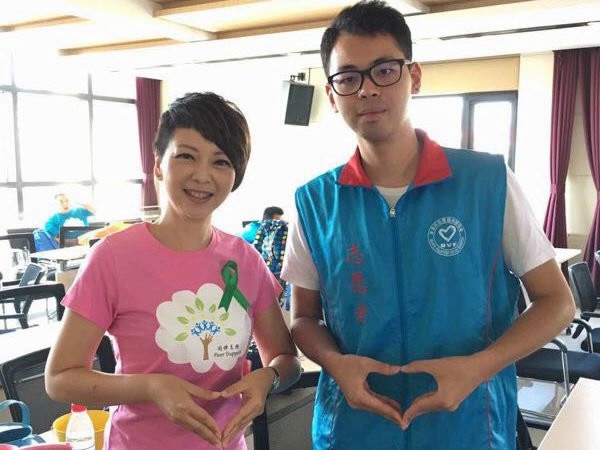
Opinions
17:27, 10-Oct-2017
Mental Health: A cause that needs your support
By CGTN’s Tian Wei

A few things have recently reminded me that awareness of mental health varies from country to country. Advocacy has become a big challenge for many countries, developed and developing economies alike.
"He was a sick man, a demented man." That was how US President Donald Trump in his first- reaction speech to the nation, described Stephen Paddock, the man responsible for the mass shooting in Las Vegas, where killed or injured around 600 people.
We know now, that it was the largest mass shooting in America’s recent history. Trump used words to suggest the gunman had mental health issues. His speech was hailed as “presidential”, an adjective rarely applied to Trump these days by media organizations.

Tian Wei and a volunteer of the community for patients recovering from mental health problems in Beijing’s Chaoyang district. /CGTN Photo
Tian Wei and a volunteer of the community for patients recovering from mental health problems in Beijing’s Chaoyang district. /CGTN Photo
However, after days of investigation, there is no evidence that Paddock was insane. In fact, he had no history of mental illness, nor did he exhibit any signs of mental health issues prior to the shooting rampage.
It is no secret that there is a tendency to attach the tag of “mental health problem” to whoever has created a disaster and yet others aren’t able to come up with reasonable explanations, so that difficult questions of governance and societal challenges can safely and secretively remain unaddressed.
In this American context, it is their special-interest-ladened gun-control problem, of course.

Tian Wei is involved in the production of MV's process. /CGTN
Tian Wei is involved in the production of MV's process. /CGTN
Excuses no more
The mental health issue has been used as an excuse, as indicated in the previous case, to escape the real issues. But how much attention, in fact, has been dedicated to mental health worldwide?
With one in four people expected to suffer from mental illness at some point in their life, a lot of us know its importance, as we have suffered from mental health problems at different stages of our lives to varying degrees: some minor, others more challenging.
But we have also seen a reluctance to face the problem, publicly support the cause, and sadly even sometimes, creating bad-taste jokes because we want to feel superior to a group of people that urgently need our help. It could be a new mother struggling with postnatal depression, a teenager with an eating disorder, or an older person isolated and lonely at home, students under enormous pressure for academic excellence and competition….. the list goes on….
But things are changing, hopefully for the better, as more and more public figures are standing up to promote the cause.
Prince Harry from the British Royal Family, for example, admitted in public that he struggled with his own mental health after the 1997 death of his mother, Princess Diana. Remembering well what he himself went through, he has encouraged others to seek help and start a dialogue.
In fact, William, Kate and Harry have been campaigning together for young and old people to start conversations at home, among friends and in schools, and encourage children to speak up and ask for help.
We have also seen enormous press coverage of how two UK Prime Ministers, Theresa May and David Cameron, in recent years devoted their early days in Number 10 to addressing the country’s mental health issues.
For China, a developing country and an emerging economy, signs are mixed. The country is developing dramatically fast. It wold be a lie to say that you can’t see the high level of anxiety among some people, both in their professional life and family life. There is an urgent need to provide efficient information and raise awareness about mental health among the public.
Unfortunately, when the mental health issues of some public figures were revealed in the press, there was a tendency of making them paparazzi stories rather than using them as an opportunity to help the public understand ways to prevent mental health problems and learn the basic tools to deal with mental health challenges once they occur.
But of course, there are positive signs too, in fact, strong positive signs. If you ask mental health professionals in China, Programme 686, would be the first thing they would mention. The project got its name due to the scale it had originally in mind to create. It started from 60 demonstration sites in 2005; by the end of 2014 it had been rolled out to more than 86 percent of administrative districts in China and will eventually cover the whole country. Its formal name is the "National Continuing Management and Intervention Programme for Psychoses.”

the Green Ribbon
the Green Ribbon
Making things better
What it is really doing is to "break out of the hospital walls and extend care to the community”: building patient-centered, recovery-based care. That kind of care would be managed by multi-disciplinary teams based in community clinics. These teams would include doctors and nurses but also social workers, case managers, local police and family and patient representatives. Each clinic would also receive specialist support from an existing nearby psychiatric hospital, to which it could refer, and from which it would have referred, patients as the need arose.
"Mental Health and Integration, a recent report about Asian countries’ mental health and mental health care issues, put forward by the Economist Intelligence Unit, suggested "Various factors have contributed greatly to its success, such as: adequate funding—including for needs-based help in paying for treatment; support from the government and global experts; and the translation of international best practice in a culturally appropriate way. Before its launch in 2005, community mental health care did not exist in China. Instead, all treatment occurred in several hundred dilapidated psychiatric institutions.”
To find out about the real situation, I recently participated in a community event for patients recovering from mental health problems in Beijing’s Chaoyang district. It was an interesting day spent with many new friends. They are recovering well with the help of the community, and more importantly, are helping one another in their monthly community event to share courage and stories.
In fact, over the past year in which I have been serving as China’s National Advocacy Ambassador for Mental Health, I have had the pleasure of getting to know a number of doctors, nurses, patients and their families. They each have a story of struggle which deserves enormous respect. And they each are working to make things better in their own way.
The project covers patients with severe mental health histories. It is urgently needed and should be continuously implemented. At the same time, one needs to note, there is a huge base of people in China that need basic knowledge and simple tools to prevent and deal with mental health challenges when they occur. Efforts devoted to cure and recoveries are extremely important though.
There are still a lot of things to be done. And let’s put our hearts and minds together, to make it happen.

(The author is anchor of CGTN’s World Insight and China’s National Advocacy Ambassador for Mental Health. The article reflects the author's opinion, and not necessarily the views of CGTN.)

SITEMAP
Copyright © 2018 CGTN. Beijing ICP prepared NO.16065310-3
Copyright © 2018 CGTN. Beijing ICP prepared NO.16065310-3